My heart beats for the wonders of the past, the beauty of diverse tongues, the excitement of exploration, the rhythm of melodies, the creativity of art, and the magic of storytelling.
Don't wanna be here? Send us removal request.
Photo

Mehmed II at the siege of Constantinople, 1453. Ottoman Empire.
Fatih Sultan Mehmet, İstanbul'un Fethi, 1453. Osmanlı İmparatorluğu.
61 notes
·
View notes
Text



Salt mine, Ocna Mureș, 1930. From the Budapest Municipal Photography Company archive.
4K notes
·
View notes
Text
from @romania on ig . “What is it about a winter storm that stirs something ancient in the soul? The Vaser Valley, cloaked in its alabaster raiment, offers a tableau of unearthly splendor. Here, amidst the Maramureș wilds, the venerable Mocănița train, a relic of steam and iron, threads its way through the vortex of snow. Each whistle is a hymn to forgotten epochs, each puff of smoke a specter lost in the whorls of a celestial blizzard. It doesn’t merely move through the storm—it communes with it, drawing the heavens to earth in a cosmic embrace.[…]”
6K notes
·
View notes
Text

Peleș Castle, Royal Domain of Sinaia, Prahova County, Romania,
Paul Gostielean Photography
8K notes
·
View notes
Text

Old Majestic Glass And Iron Entranceway, Bucharest, Romania
8K notes
·
View notes
Text

▪︎ Plaque with Ganymede.
Date: mid 16th century
Artist: Pierre Reymond (French, ca. 1513-after 1584)
Medium: Enamel painted on copper
49 notes
·
View notes
Text




▪︎ Cameo: Venus and Love, Lid of a Cup.
Date: 1600-1700
Artist: Giovanni Ambrogio Miseroni
665 notes
·
View notes
Text
I like people who talk to themselves interminably; I like them, for they are double. They are here and elsewhere.
Albert Camus / The Fall
143 notes
·
View notes
Text

Sophie Guillemette, Grand Duchess of Baden, 1831 Franz Xaver Winterhalter
539 notes
·
View notes
Text

Golden Shrine of Tutankhamun
This small shrine, made of wood and covered with thick gold, rests on a silver-plated sledge. The exterior and the double doors are decorated with scenes showing the king and his wife hunting and enjoying life.
The scenes on the double doors are surrounded by friezes of decorations, royal cartouches, and rekhyt birds. Rekhyt birds are lapwings or plovers with human arms that symbolize all the people ruled by the king.
Inside the shrine, an ebony pedestal and back pillar bearing the king’s name indicated that it had once housed a statue, perhaps that of the goddess Werethekau, Great of Magic, who is mentioned several times in the texts, or a statue of the king himself.
New Kingdom, 18th Dynasty, ca. 1332-1323 BC. Tomb of Tutankhamun (KV62), Valley of the Kings, Thebes. Now in the Egyptian Museum, Cairo. JE 61481
Read more
122 notes
·
View notes
Text

Stele of Neskhonsupakhered, Singer of Amun, in adoration of Ra-Horakhty
Third Intermediate Period, 21st Dynasty to 22nd Dynasty, ca. 950-800 BC. Now in the Egyptian Museum of Turin. Cat. 1598
953 notes
·
View notes




